Introduction
AI has started showing up in the everyday parts of digital marketing. It’s helping with writing content, planning campaigns, analysing performance, and saving hours each week. For many marketers, it’s becoming part of how the work gets done.
So, what’s driving this surge? In this blog, we’ll explore how AI is transforming digital marketing. You’ll learn what’s working, which tools to use, and how brands are using AI to drive efficiency, scale content, and stay ahead.
Why (& How) AI is Transforming Digital Marketing
AI in digital marketing transforms how brands create content, target audiences, and measure success. It uses data to automate repetitive tasks and improve personalization.
AI algorithms analyze user behavior to predict outcomes and optimize campaigns. Chatbots enhance engagement and improve response times. AI tools boost SEO by identifying trends and refining content. Predictive analytics provide insights that guide decisions and improve ROI.
Marketers can use AI to streamline workflows and drive real-time results. AI in digital marketing makes campaigns more effective and helps brands stay ahead in competitive markets.
The impact is clear. In a recent Reddit thread, one marketer shared how they used ChatGPT, Perplexity, and Notion to automate content briefs, outlines, and reporting across multiple clients. What used to take hours now takes minutes. That freed them up to focus on creative strategy and campaign performance.
That kind of workflow shift is becoming the norm. And the numbers reflect it. In 2024, 69.1% of marketers used AI in their strategies, a sharp increase from the previous year. Even more compelling, 93% now use it to generate content faster, and 88% rely on it for daily marketing tasks.
In 2023, AI-powered data analysis captured a significant 24.7% share of the AI in digital marketing market, according to Market.us. And the payoff is big. Companies that invest in AI are seeing 1.5x higher revenue growth and 1.4x better returns on invested capital, as reported by BCG.
“When I think about the impact of AI on digital marketing, I would think AI is trying to achieve three objectives: automation, real-time responsiveness, and scalability.” – Xu Zhang, Assistant Professor of Marketing, London Business School.
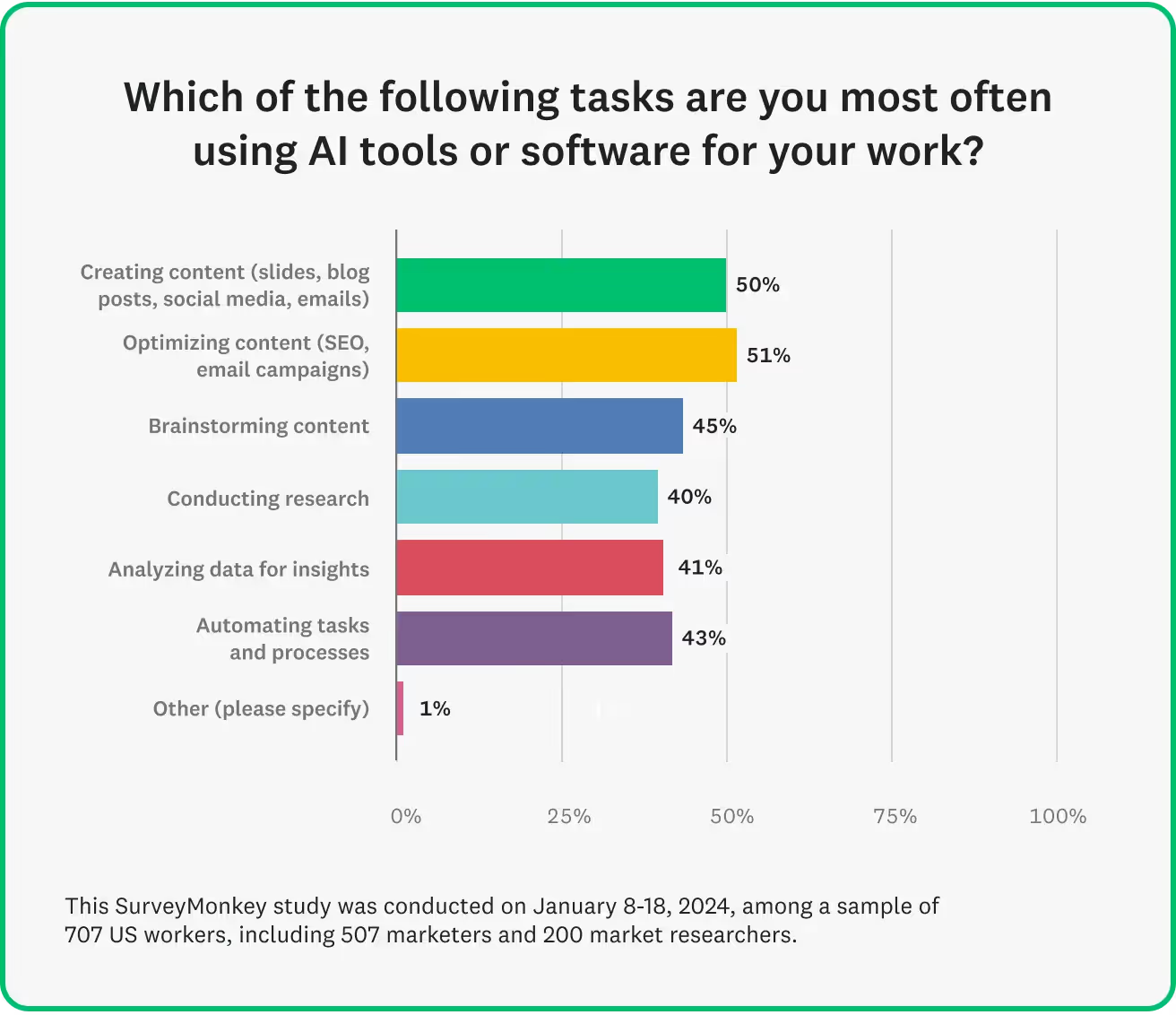
Core Applications of AI in Digital Marketing
AI’s impact in digital marketing is felt across multiple touchpoints, enabling smarter, faster, and more relevant campaigns. Let’s dive into how AI is driving these key applications and why they matter.
1. AI-Powered Content Creation
One of the biggest challenges in digital marketing is creating high-quality, relevant content at scale, and AI is revolutionizing how it’s produced. Today’s AI tools can generate high-quality written content, graphics, and even video scripts based on user data and intent.
AI tools like Jasper and HubSpot’s AI Assistants are making it easier for marketers to automate content.
- HubSpot leverages AI to suggest blog topics, refine SEO strategies, and personalize content for targeted audiences.
- Jasper enables marketers to create tailored messaging quickly and efficiently.
At Revv Growth, we used AI-powered content creation for Everstage, a sales compensation and commission tracking platform. By leveraging tools like Ahrefs, ChatGPT, and Clearscope, our AI-driven blog engine delivered multiple long-form SEO blogs that are ranking on Google, its AI overviews, and featured in ChatGPT and Perplexity AI overviews.
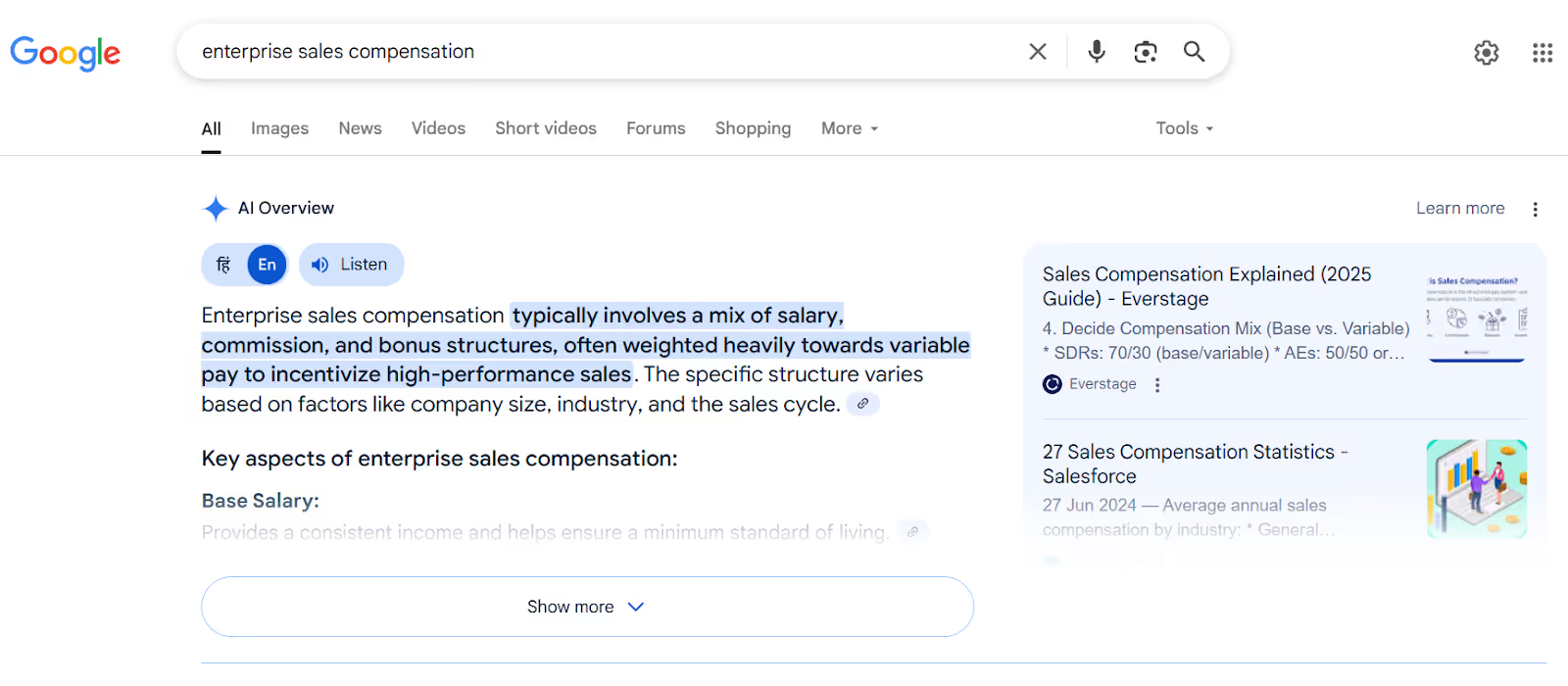
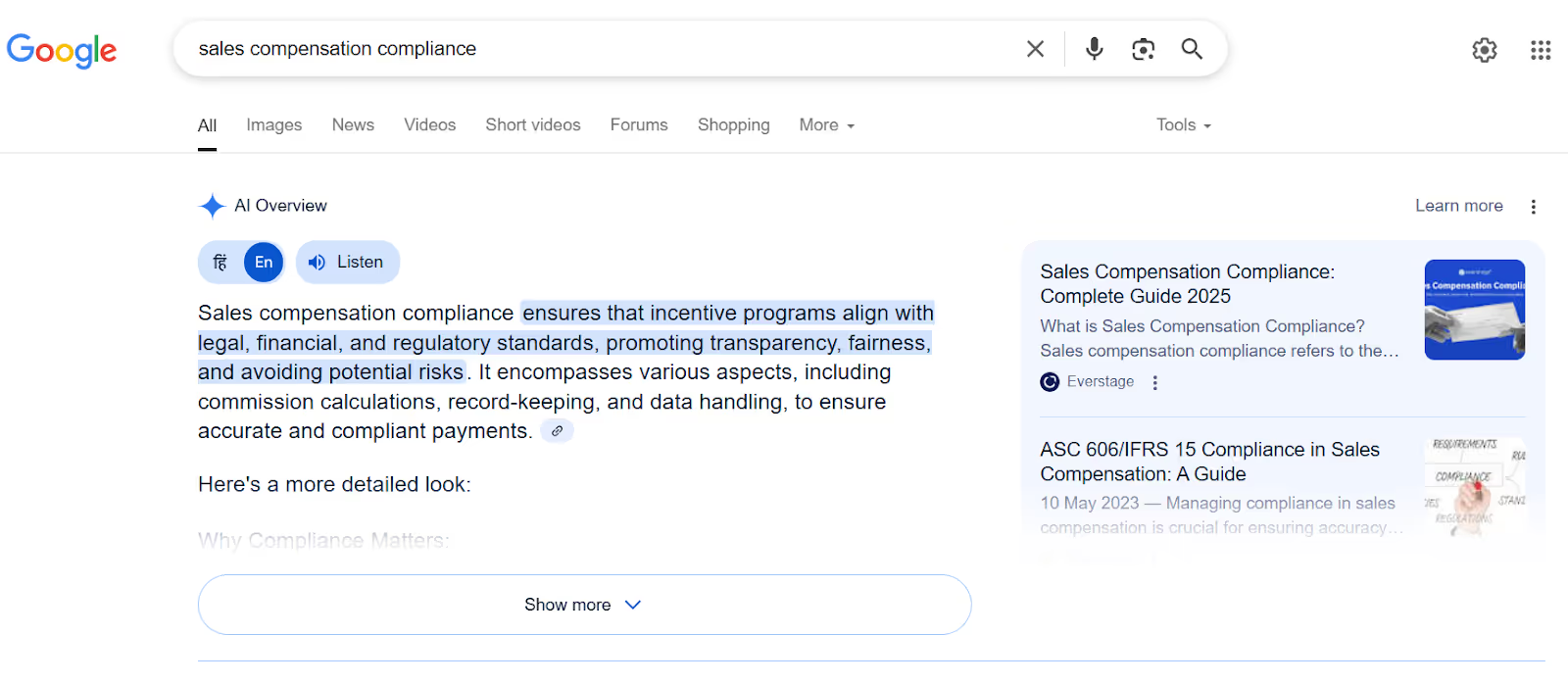
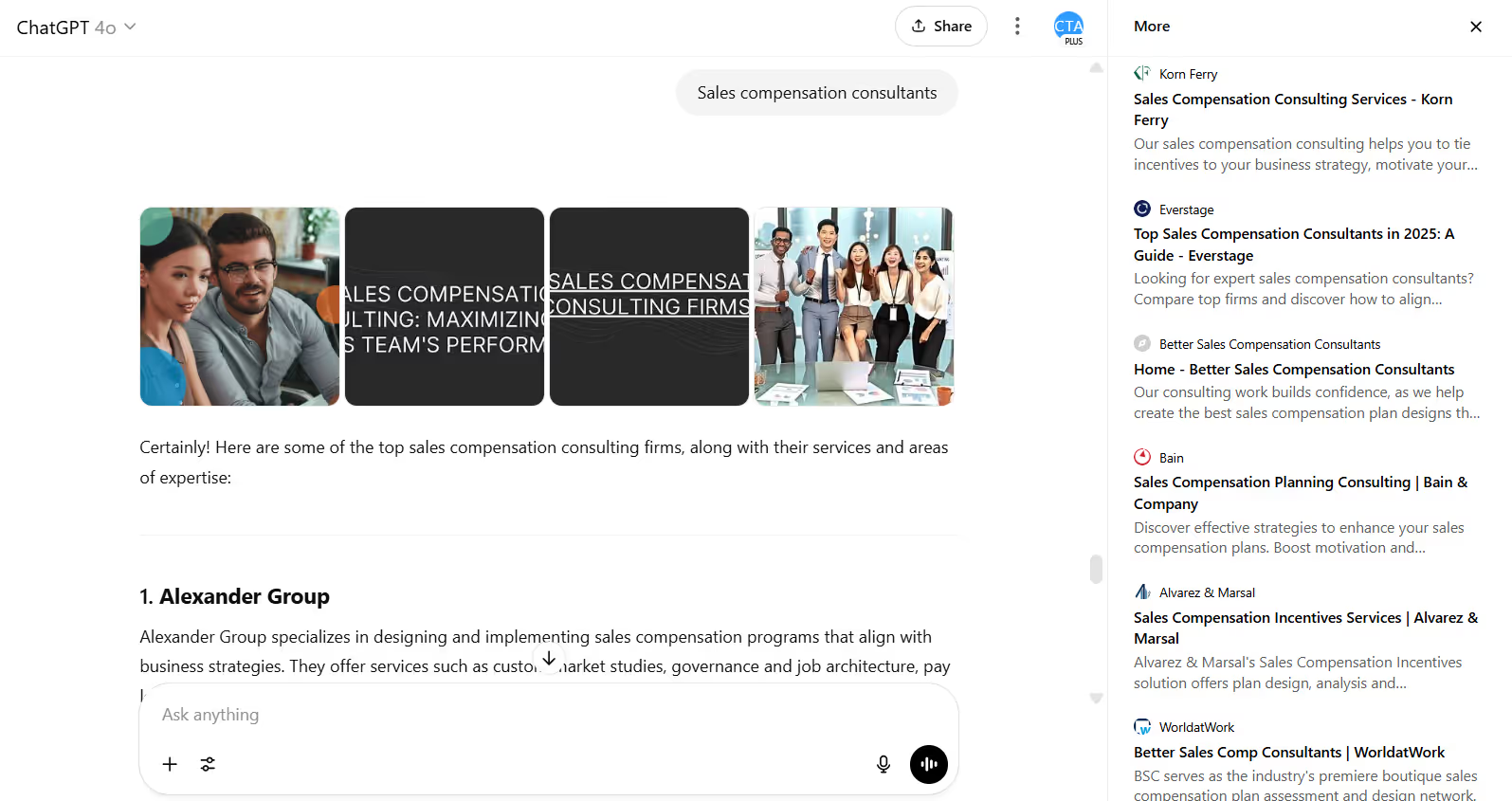

2. Chatbots for Enhanced Customer Service
Customer service is no longer just about call centers; it’s about instant, 24/7 conversations, and personalized experiences. AI-powered chatbots are making a real difference, handling everything from answering questions to guiding buyers along their journey.
Platforms like Drift and Zendesk are transforming how B2B companies interact with customers.
- Drift’s conversational bots, for example, engage visitors in real time, qualify leads, and even book meetings with your sales team.
- Zendesk’s AI-driven bots provide round-the-clock support, answering FAQs and ensuring that every customer gets the help they need, when they need it.
AI chatbots free up human agents to handle complex questions, while ensuring no lead slips through the cracks. This seamless, always-on support translates directly into increased customer satisfaction and loyalty.
3. Programmatic Advertising
One of AI’s biggest wins in digital marketing is its role in programmatic advertising, automating the buying and placement of ads. By analyzing vast amounts of user data, AI can decide in real time which ads to serve, to whom, and when.
Platforms like LinkedIn and The Trade Desk have harnessed AI to automate everything from bidding to audience segmentation.
- LinkedIn uses AI to analyze job titles, industries, and engagement behaviors, so your sponsored content lands in front of the most relevant decision-makers.
- The Trade Desk, on the other hand, combines programmatic ad buying with account-based marketing strategies, helping marketers like you get the most out of every dollar spent.
What’s powerful about AI in programmatic advertising is how it learns and adapts. Instead of setting your campaign and hoping for the best, AI constantly adjusts your targeting and creative, making sure your message lands with precision.
4. AI Tools for SEO Optimization
Search engine visibility is a top priority for any digital marketer, but keeping up with search engine algorithms and user trends is a never-ending challenge. AI tools for SEO optimization are making it easier than ever to stay ahead.
AI tools like MarketMuse and Clearscope use algorithms to identify content gaps, suggest topics, and fine-tune SEO strategies.
- MarketMuse analyzes your entire content strategy to find opportunities and strengthen your competitive edge.
- Clearscope makes it easy to refine your content based on search intent, so you’re not just chasing rankings but serving real user needs.
At Revv Growth, we optimized Atlan’s content for featured snippets using AI-driven workflows and human reviews, boosting their visibility in search rankings and driving substantial organic traffic.
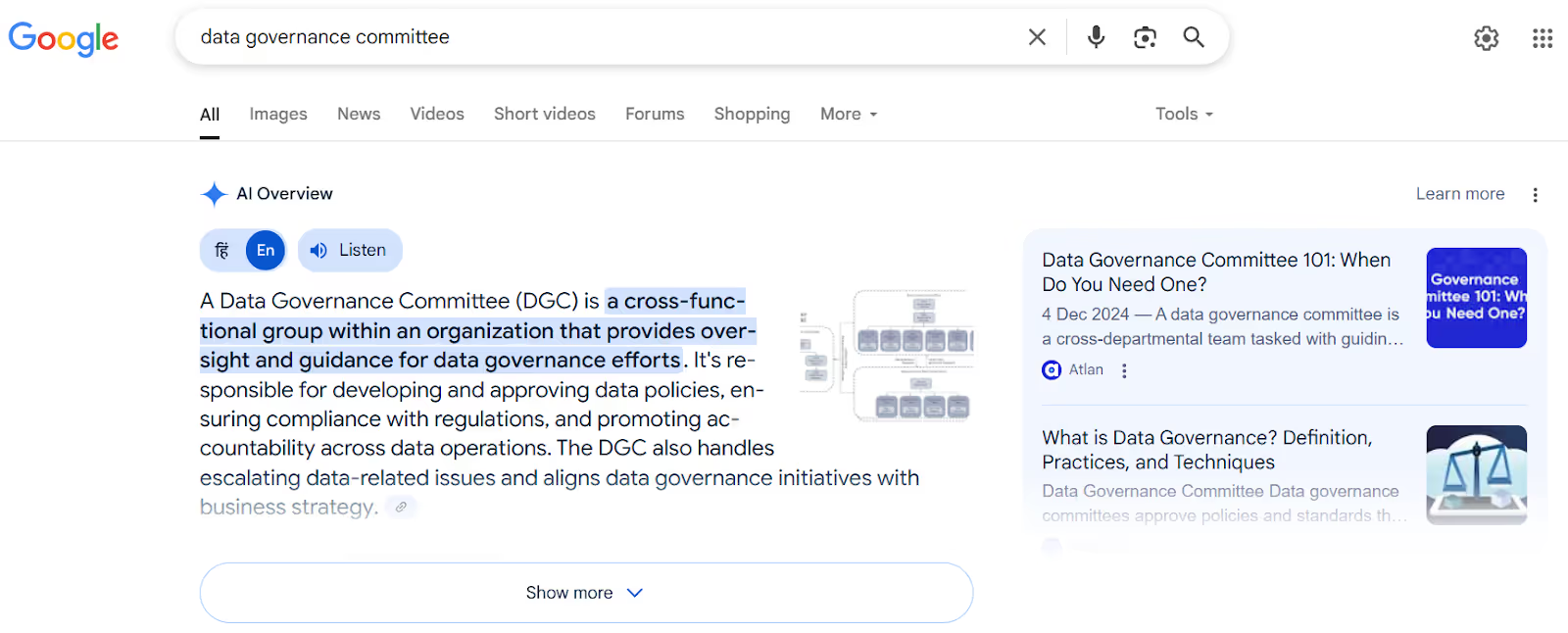

By analyzing trends and competitor strategies, these AI-powered SEO tools offer a level of precision that was impossible even a few years ago.
5. Predictive Analytics for Customer Behavior
AI’s ability to analyze historical and real-time data means marketers can now predict what customers want before they even ask. Predictive analytics lets you go beyond assumptions, using data to see patterns like what triggers a purchase or which signals indicate churn risk. This lets you craft campaigns that are truly personalized and targeted.
Predictive analytics tools like Salesforce Einstein and 6sense are making this possible.
- Salesforce Einstein, for instance, analyzes past behaviors and current engagement to score leads based on their likelihood to convert.
- 6sense leverages AI to uncover anonymous buying signals and predict which accounts are ready for outreach.
Marketers in this Reddit thread have been discussing how these tools help them focus on high-intent prospects, cutting down wasted time and boosting conversions.
In the words of Neil Patel, Co-Founder at Neil Patel Digital, “A big portion of what businesses are looking to use AI from a marketing standpoint is analytics — how can you have AI analyze your analytics on a daily basis and tell you where the wastage is within your marketing campaigns and where you can cut costs and reallocate money.”
6. The Role of AI Agents in Marketing
AI agents are the next frontier, handling everything from lead nurturing to content personalization at a scale we never thought possible. Unlike static chatbots, AI agents are designed to handle complex tasks, acting almost like digital teammates that can think and adapt on the fly.
Take tools like HubSpot’s Breeze AI Agent and Coworker for example.
- HubSpot’s Breeze AI Agent automates repetitive marketing tasks like follow-ups and email personalization, giving marketers more time to focus on the bigger picture like strategy and creative campaigns.
- Coworker has introduced AI “teammates” that can even handle research, sales support, and complex project management, becoming a true extension of your marketing team.
These AI agents don’t just automate tasks; they actively improve campaign performance by adapting to new data and user interactions in real time. They’re the trusted collaborators, helping marketers scale without adding extra headcount.
How B2B Companies are Using AI for Marketing
In B2B marketing, long sales cycles and multiple decision-makers make it hard to know where to focus. That’s why AI is becoming a must-have for marketers as it helps identify high-potential leads, personalize campaigns, and automate customer service at scale.
Here are some real-world examples of how B2B companies are using AI.
1. Lead Scoring and Predictive Lead Generation
Lead scoring has always been a key part of B2B marketing, but it used to be a manual, guess-filled process. Now, AI tools like Marketo and Lift AI are making it easier to prioritize leads based on real-time signals and buyer intent.
- Chronus + 6sense + Lift AI: Chronus integrated 6sense with Lift AI to refine their lead prioritization strategy. By combining 6sense's account-level insights with Lift AI's real-time buyer intent scoring, Chronus identified high-intent individuals within target accounts. This integration led to a 6x increase in conversion rates for visitors in the purchase stage and an 11.6x boost in sales efficiency, as the sales team could focus on the most promising leads.
- Interactive + Marketo Engage: Interactive implemented Marketo Engage to automate and refine their lead management process. By leveraging lead scoring, they could prioritize leads based on engagement and readiness to buy. This resulted in an increase in Sales Accepted Leads (SALs), from 50 to between 200 and 400 per month, and an improvement in the Sales Accepted to Won ratio from less than 2% to 8.3%.
That’s not just better targeting; it’s a complete rethink of how B2B marketing works. For me, AI-driven lead scoring is about building a pipeline that’s smarter and more sustainable, one high-intent lead at a time.
2. Customer Segmentation and Personalization
Understanding your audience is everything in B2B marketing. But segmenting customers used to mean hours of combing through data and trying to guess who would respond to what. With AI, this guesswork is over. AI tools like ZoomInfo and Demandbase are leading the charge here.
- ZoomInfo + G2: ZoomInfo’s AI capabilities help B2B marketers analyze huge datasets to build detailed customer profiles, combining firmographics, intent data, and online behavior. In fact, ZoomInfo integrated G2 Buyer Intent data to fine-tune their lead targeting, boosting conversion rates by 17% and cutting cost per lead by 27%.
- IBM + Demandbase: IBM leveraged Demandbase’s AI-driven personalization for their US Open campaign. They tripled account identification and doubled top account engagement, showing just how powerful AI can be when it comes to building campaigns that truly resonate.

Marketers on Reddit have shared how this kind of segmentation and personalization has taken their campaigns to the next level. For me, it’s a clear signal: AI isn’t just helping us reach audiences; it’s helping us understand them on a deeper level.
3. Automation of Customer Service with Chatbots
Great customer service is the backbone of B2B success, but delivering it around the clock is easier said than done. That’s why AI-powered chatbots like Zendesk’s Answer Bot and Intercom AI chatbots have become an essential part of the toolkit for modern B2B marketers.
- Atlassian + Intercom: Atlassian uses Intercom’s AI chatbots to handle routine customer questions and provide instant product support, freeing up human agents to focus on complex problems. The result? Faster resolution times and reduced support burden for human agents, leading to increased product adoption and customer satisfaction.
- Shopify Plus + Zendesk Answer Bot: Shopify Plus leverages Zendesk’s Answer Bot to automatically answer frequently asked questions and suggest relevant articles to B2B merchants. This reduced ticket volume by automatically resolving up to 10% of incoming queries, freeing up human agents for more complex issues.
Marketers in this Reddit thread also agree that chatbots can go beyond just answering questions; they can collect valuable data, highlight trends, and provide insights that feed back into smarter marketing strategies.
Developing an AI-Driven Digital Marketing Strategy
Implementing AI is about rethinking how you approach marketing altogether. AI can boost your campaigns, but to get the most out of it, you need a strategy that ties everything together.
Here’s how you can approach building an AI-driven digital marketing strategy.
1. Setting Clear Objectives
Start by identifying where AI can make the biggest difference for your business. Are you trying to generate more qualified leads? Reduce customer churn? Improve the ROI of your ad spend?
Break down those goals into measurable steps. For example:
- Lead Conversion: Target a 10–20% increase in conversions with predictive lead scoring.
- Customer Retention: Use AI chatbots to boost customer satisfaction scores by 15% or more.
- Content Performance: Aim to improve organic search traffic by 30% with AI SEO tools.
Having these numbers in place makes it easier to test, iterate, and prove the value of your AI initiatives. It also helps keep your team aligned as everyone knows exactly what they’re working towards and how to measure success.
2. Selecting the Right AI Tools
The next step is picking the AI tools that fit your goals and workflows. It’s easy to get caught up in the hype, but the best tools are the ones that solve your problems.
When evaluating AI tools, think about:
- Ease of Use: Will your team be able to pick it up quickly?
- Integration: Does it work with your existing tech stack?
- Customization: Can you tailor it to your specific needs?
It’s also worth considering the scalability of the tool. Can it grow with you as your business evolves? And don’t forget to factor in customer support as AI tools are powerful, but even the best need human backup.
3. Integrating AI into Existing Workflows
The next key step is to start small and iterate. Begin with pilot projects like testing AI chatbots on smaller segments or using AI SEO tools for a single content pillar before rolling them out across all campaigns.
Here’s what works best:
- Train Your Team: Make sure everyone knows how to use the new tools and why they matter.
- Map Out Workflows: Identify where AI can slot in naturally, like automating repetitive tasks or enhancing data analysis.
- Iterate and Learn: Treat AI integration like a continuous experiment, not a one-time event.
The more natural the integration, the more your team can focus on what matters most: building campaigns that connect and convert.
4. Measuring AI Impact and ROI
Start by aligning your measurement approach with your goals. If you’re aiming to boost conversions, track metrics like lead quality and win rates. If it’s about retention, look at churn rates and customer lifetime value.
Some KPIs to consider:
- Engagement Rates: Are people interacting more with your content?
- Conversion Rates: Are leads turning into customers more often?
- Cost Savings: How much time and money are you saving with AI automation?
Measuring impact is more than just about proving ROI to stakeholders. It is about learning what’s working, what’s not, and how to keep improving. Because that’s how you turn AI from a trend into a long-term competitive advantage.
Best Practices for Implementing AI in Digital Marketing
Embracing AI isn’t just about adding new tools to your stack; it’s about shifting your mindset and evolving your processes. Here’s how you can make sure your AI initiatives deliver real results.
1. Test and Learn Approach
AI works best when you start small and iterate. In 2024, 69.1% of marketers already reported using AI in their strategies, up from 61.4% in 2023. This growth underscores how testing and refining AI applications can lead to broader adoption and bigger results.
Begin with pilot programs in areas like predictive analytics or content creation, and use data-driven insights to measure impact before scaling up.

2. Focusing on Customer-Centricity
AI isn’t just about data and automation. It’s about using those tools to create more personal, relevant experiences for your audience. Use AI to understand customer behaviors and create tailored messaging that resonates on a personal level.
For instance, AI-powered chatbots can handle routine questions, freeing up your team to focus on real, human connections. Meanwhile, AI-driven content recommendations ensure every interaction feels tailored and engaging.
3. Continuous Monitoring and Optimization
AI isn’t a one-and-done solution. Its real value comes from constant learning and evolution. As customer behaviors shift and new data emerges, successful marketers keep a close eye on performance.
45% of commercial leaders predict that generative AI will significantly enhance marketing analytics and customer journey mapping, according to McKinsey.
By refining campaigns and strategies in real time, you can stay ahead of the curve and ensure your AI investments continue to pay off.
4. Balancing Automation and Human Creativity
AI can handle the heavy lifting when it comes to data crunching and routine tasks. But it can’t replace the creativity and empathy that make marketing truly resonate. That’s why the most successful AI strategies let machines handle the repetitive work while humans focus on big ideas and building authentic connections.
These best practices are about adopting AI and making it work in service of your marketing vision, not in place of it.
Challenges and Ethical Considerations
As AI becomes a core part of digital marketing, it’s essential to address the challenges and ethical questions it raises.
1. Data Privacy and Security
One of the most pressing issues is data privacy. AI tools rely on vast amounts of data to deliver personalized experiences, but that also means handling sensitive information.
According to McKinsey, 65% of organizations in 2024 reported using generative AI in at least one business function, highlighting the growing reliance on data-driven tools.
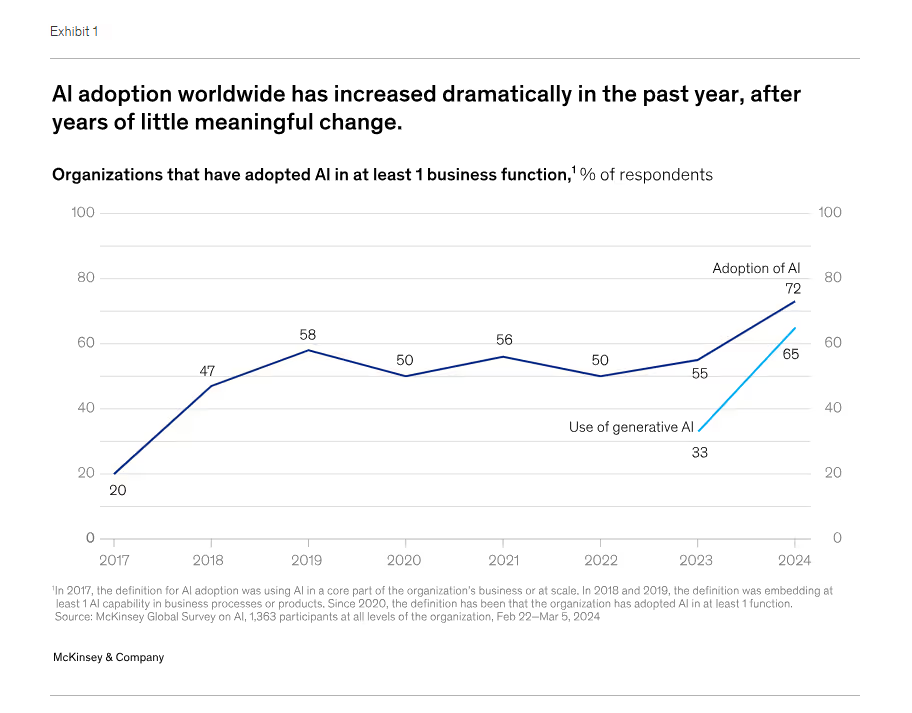
As marketers, we must comply with regulations like GDPR and CCPA to ensure that data is collected, stored, and used responsibly.
2. Ensuring Transparency and Avoiding Bias
AI models are only as good as the data that feeds them. If the data is biased, the AI’s recommendations can be skewed, leading to unfair targeting and exclusion of certain audiences. Maintaining fairness and transparency is crucial to ensure campaigns are inclusive and ethical.
It’s also important to explain to customers how AI is involved in personalization or decision-making. Clear communication about AI’s role and the safeguards you have in place builds trust and reassures your audience that their data is being used responsibly.
3. Navigating Regulatory Compliance
The rules around AI and data use are evolving fast. GDPR in Europe and CCPA in California are just the start; new regulations are emerging that marketers must understand and respect. Ignoring them isn’t just risky; it can lead to fines and reputational damage.
As AI becomes more central to marketing, staying on top of these requirements is vital to ensure that every campaign is both compliant and trustworthy.
Future Trends in AI and Digital Marketing
AI in digital marketing is evolving quickly, opening up new possibilities that are reshaping how we connect with audiences.
1. Voice Search and Conversational AI
Voice search is transforming content strategies. With more users relying on voice assistants, optimizing for natural language queries and conversational content has become essential. It’s about answering questions directly and integrating seamlessly into daily routines.
2. AI-Generated Visual and Video Content
Visuals have always been a cornerstone of marketing, and AI is making them more powerful than ever. Generative AI platforms can create everything from engaging graphics to video content in minutes, freeing marketers to focus on strategy and storytelling. This speeds up production and allows brands to experiment with more creative formats.
3. Hyper-Personalization and Predictive AI
Personalization is moving beyond broad audience segments to truly individualized experiences. Predictive AI can now tailor content, messaging, and offers based on user behaviors and preferences, creating campaigns that feel uniquely relevant to every prospect or customer. This data-driven approach leads to more authentic connections and better ROI.
“Over 4 million people are using AI to generate creative… taking a piece of creative and making it better are right now in the foothills of their capabilities. You can imagine a future where the creative is going to be perfect for every individual.” – Alex Schultz, CMO & VP of Analytics at Meta
Conclusion
AI has reshaped digital marketing, turning data into insights and automation into opportunity. From content creation to hyper-personalization, it’s clear that AI is here to stay, helping marketers like you create campaigns that truly resonate.
As you explore AI for your own strategies, focus on setting clear goals, integrating AI thoughtfully, and balancing automation with creativity. Because when you use AI with intention, you’re setting the pace for the future.
If you’re ready to harness AI in your marketing strategy and unlock its full potential, Revv Growth can help. Book a call to know how we can make your AI-powered marketing dreams a reality.

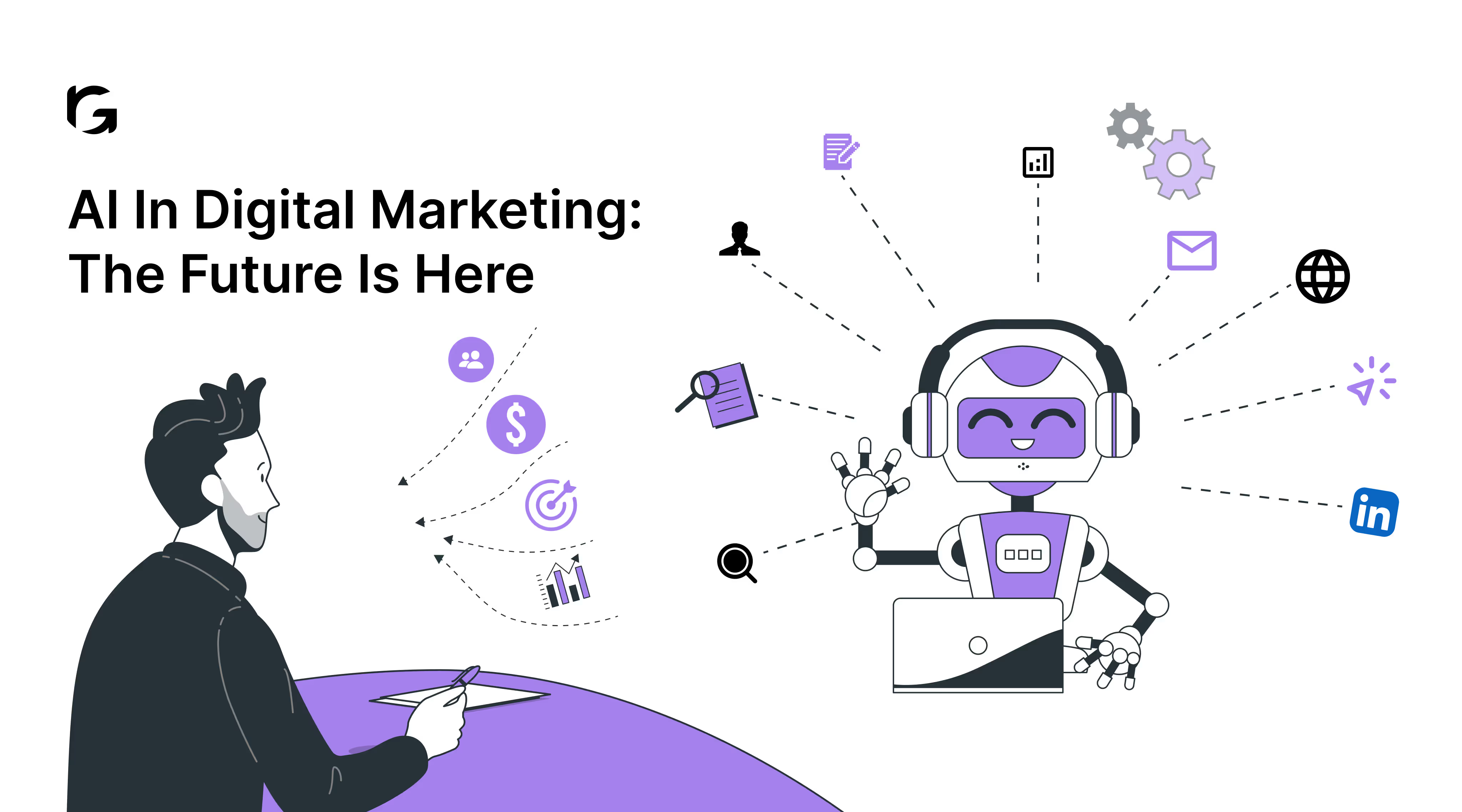

.svg)
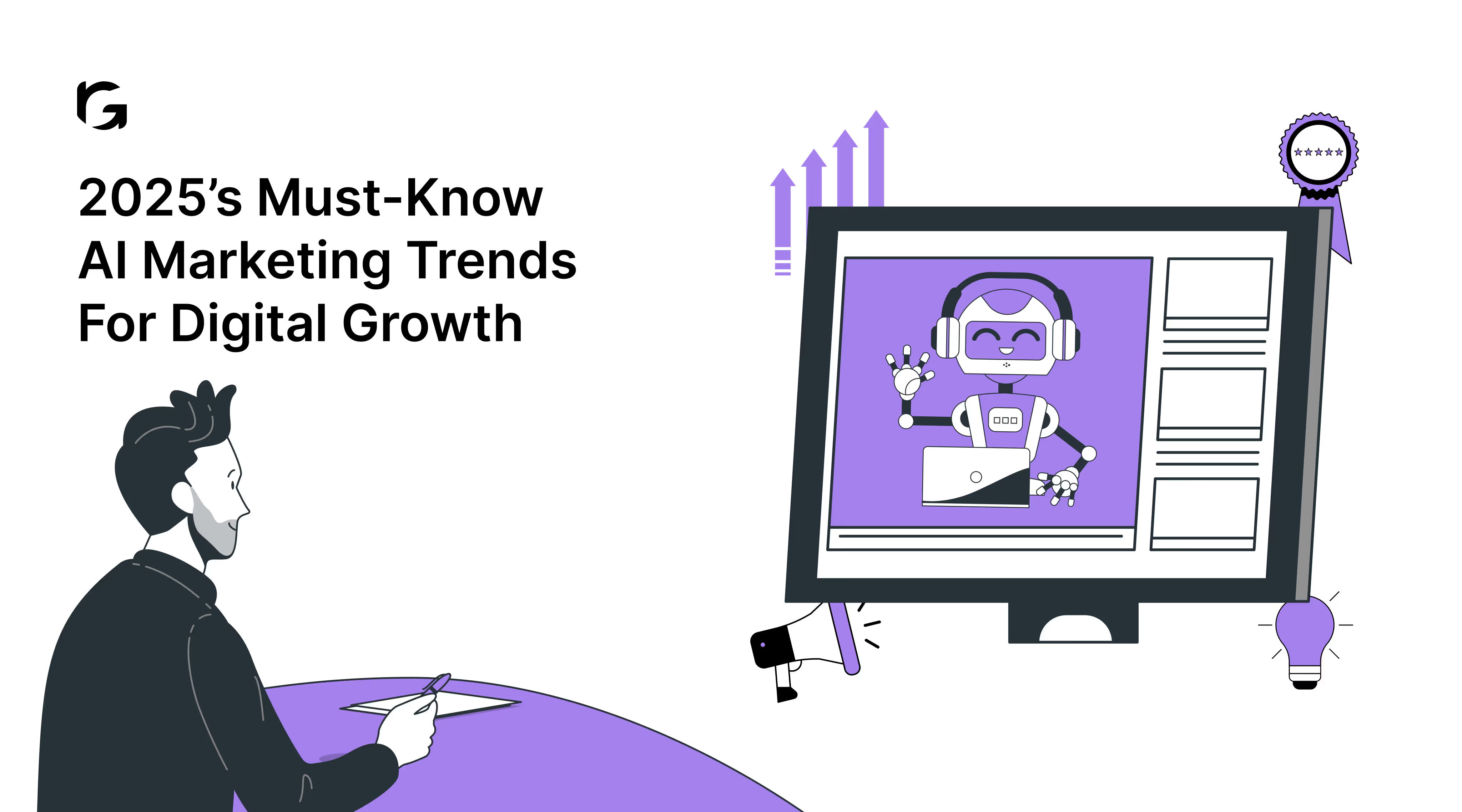
.avif)
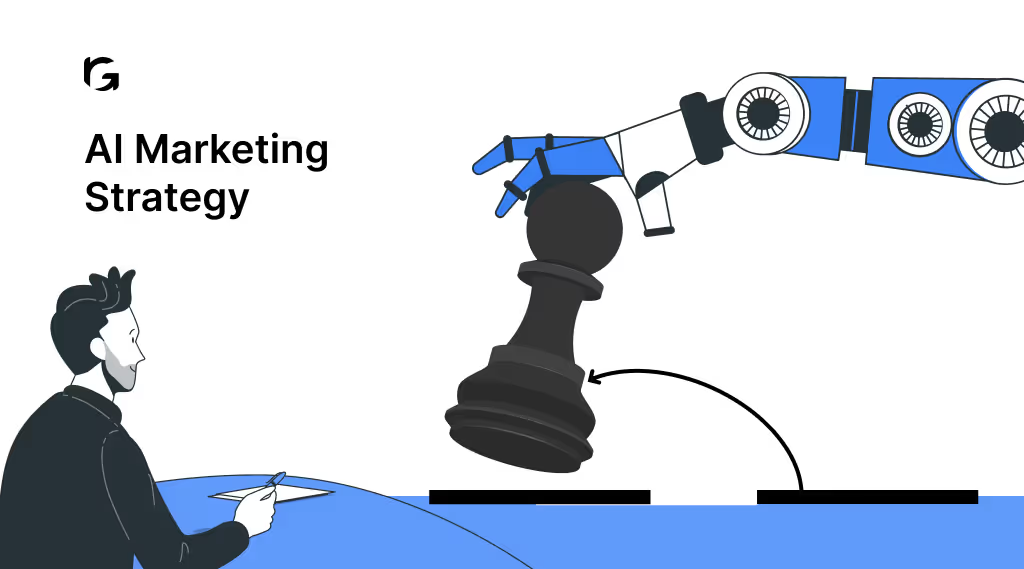
.webp)